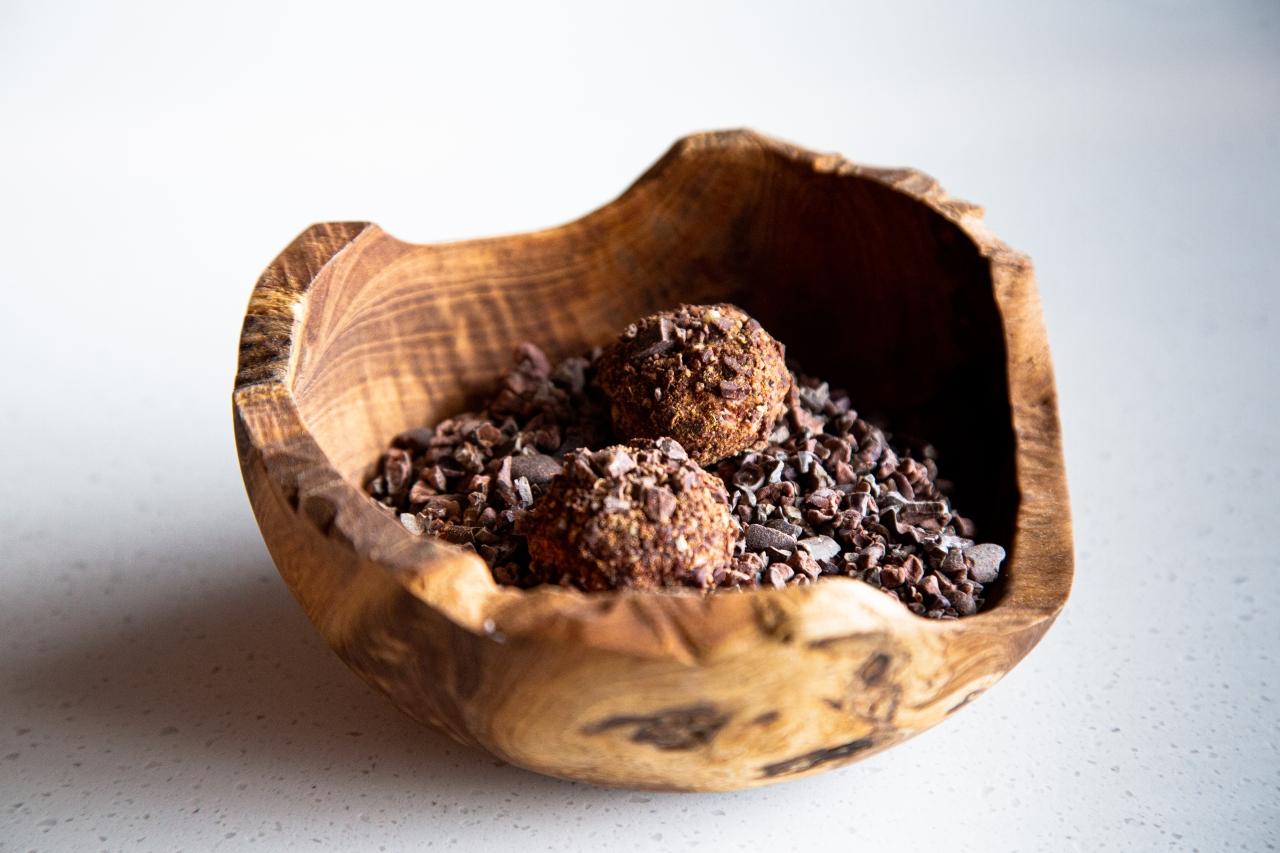
13 minute read
Traditional cuisine aims high at Emazulwini
from Stirring Change in Culinary Arts | The BeyondCuisine Narrative
by Selected Hotels Promotion L.C. | CHC CoutureHospitalityConcept | HoteliersGuild
Emerging from the kitchens of top fine dining restaurants, Mmabatho Molefe stepped out on her own with a tiny restaurant at Makers Landing where she presents traditional Zulu cuisine in a fine dining context. ‘It’s the food we grew up eating, prepared in a modern way,’ she told TGIFood.
It’s hard not to gush about the food at Emazulwini, the tiny 10-seater restaurant at Makers Landing, with its harbour view, where chef Mmabatho Molefe takes her traditional childhood favourites and transforms them into a fine dining experience. Each of the seven courses on the summer menu (launched in February 2022) has a personal description by Molefe of her memories and how they have influenced her modern interpretation of them. For example – and I begin with the third course because even though nobody asked, it was my favourite – the igwinya nopholoni. The story behind it: “To me it represents a perfect Friday. Growing up, my parents always used to make us packed lunches, except on Fridays. Friday was a chance for us to be like all the other kids who got spending money. We used to get exactly R1.50 which was just enough to get igwinya nopolony and it would be my perfect start to the weekend.” ”
Advertisement
It is a light puff of a vetkoek anchored by white Cheddar catalan, topped with roasted parmesan, and the pièce de résistance, a square of crispy chicken skin which is all sorts of crunchy wonderfulness. I could probably quite happily eat an entire platter of these, but the meal at Emazulwini is a set one, for a set price. I broached the subject with Molefe after lunch.
“Before, we used to have items priced individually but with this menu it’s a bit difficult because the portion sizes are so considered, so it’s hard to charge someone for one without feeling that you’re ripping them off,” she said with a smile. “So that’s why we’ve decided to do it this way. Perhaps as we get more comfortable with the menu we’ll decide which portion can work for à la carte or a single serving.” Which is fair and I respect her decision, but I still want more igwinya, and I’m willing to pay the price.
I met Molefe shortly after Makers Landing opened at the end of 2020. She had been retrenched from Salsify At The Roundhouse, Camps Bay, during lockdown, and with previous experience at Aubergine she used her skills to present traditional Zulu cuisine in a fine dining context. Back then, she said having her own restaurant at Makers Landing (if you can cast your mind back through the mists of time) was great, although quiet. “But it was what we needed to get into the space and find our routine,” she said. “But most of all it’s been growing so much since opening day. Part of the space is to teach and we really are learning a lot from the curators and established businesses.”
Chatting to her again in March 2022 (as far as I know, because things have been weird and I know I’m not the only one who is confused about what year it is), I asked how it’s going now. Molefe laughs. “I think it’s been a rollercoaster, I think that’s the perfect way to describe it,” she said. “But I think in terms of our food and how it’s looking, the future of it, I think it just keeps getting better and better – and more refined.
“Starting out, our portions were bigger; people were getting fuller quicker. So now we’re figured out what works best for our style of food and I’m happy with that.”
The meal begins with umbila, mielie bread sticks with sweetcorn dip and parsley mayo. Actually it begins with Molefe’s introduction: “This menu is a dedication to my parents, just two systemically traumatised kids raising beautiful black queens. I don’t tell them enough (at all) but they are the loves of my life.” Molefe has four sisters and a brother so we can imagine her parents have their work cut out for them.
“This meal is going to take you about two and a half hours to eat. Inasmuch as I would love to explain all the courses in person, I also don’t want to end up crying at your table. So please keep this menu as a reminder of the meal you just had,” it continues. And then this part activated my tear ducts just a tiny bit, so heartfelt is it: “At the end of the meal, if you can, call your parents and tell them you love them. If you can’t, just tell us because we love you too!” It made me grateful I speak to my mother on a daily basis.
Course two is isibindi no-anyanyisi – chicken liver truffle with onion jam and chocolate crumb. A sweet and savoury combination that is given such a delicate touch that each element is balanced.
Then the vetkoek of which we have spoken, followed by ulimi noshatini. This is corned beef tongue with tomato puree, amasi, chillies, tomato jellies and crispy onion. “I think chicken livers and onions is the combo of all combos. It just takes me back to breakfast at my gran’s with the whole family around,” says Molefe in her notes on the dish. If you’re paying attention, you will be beginning to notice certain ingredients. Like liver. Like tongue.
Molefe’s notes say: “I feel like I am going out on a limb with this dish because the flavours of chicken necks are so familiar to me, but I can’t really pinpoint the exact time and memory. Also, who wouldn’t want to include a meat mousse on their menu. I hope you enjoy it because I’m a bit proud of it.” papa neklabishi, braised beef heart with cabbage and creamy pap. (Photo: Supplied)
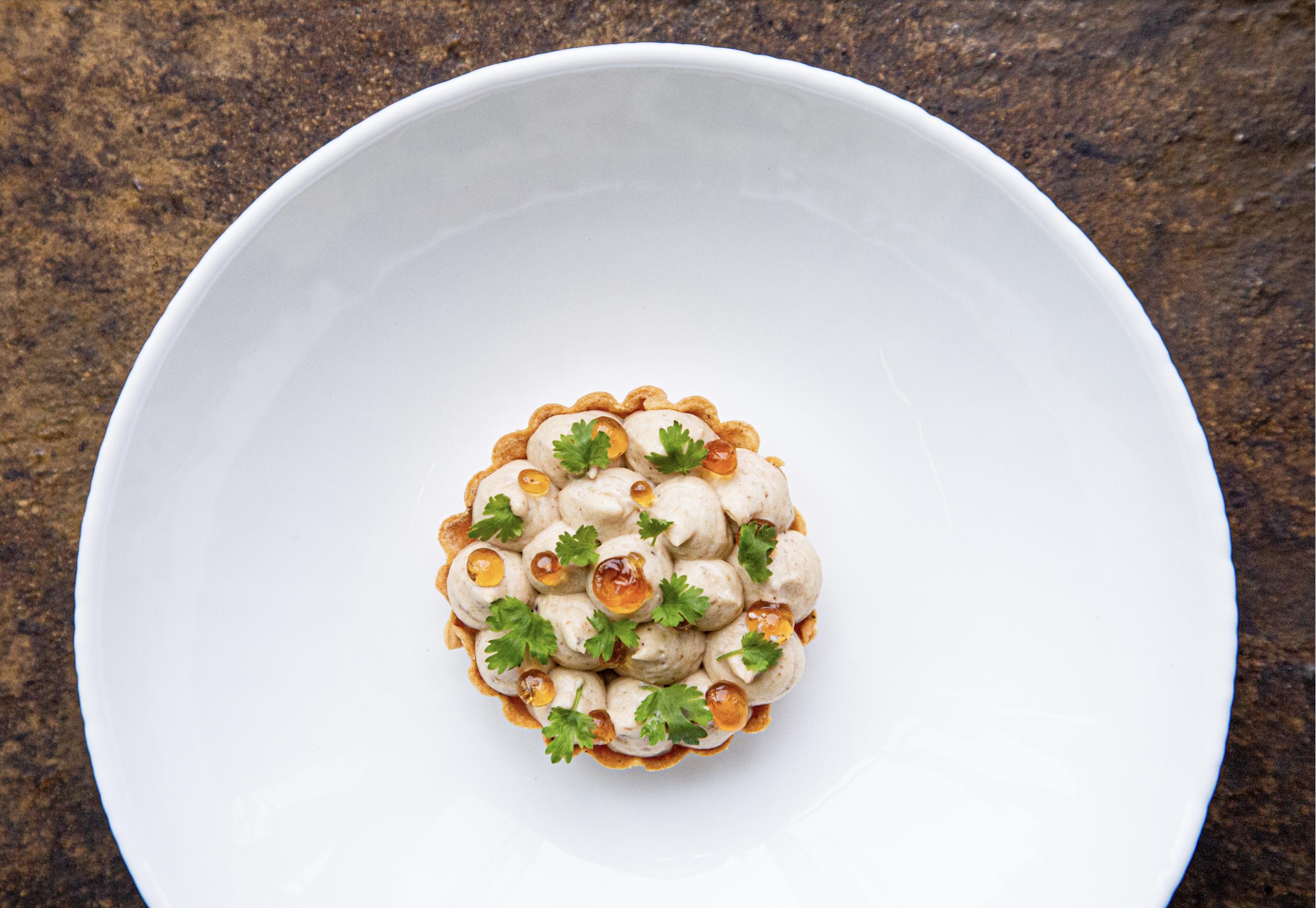
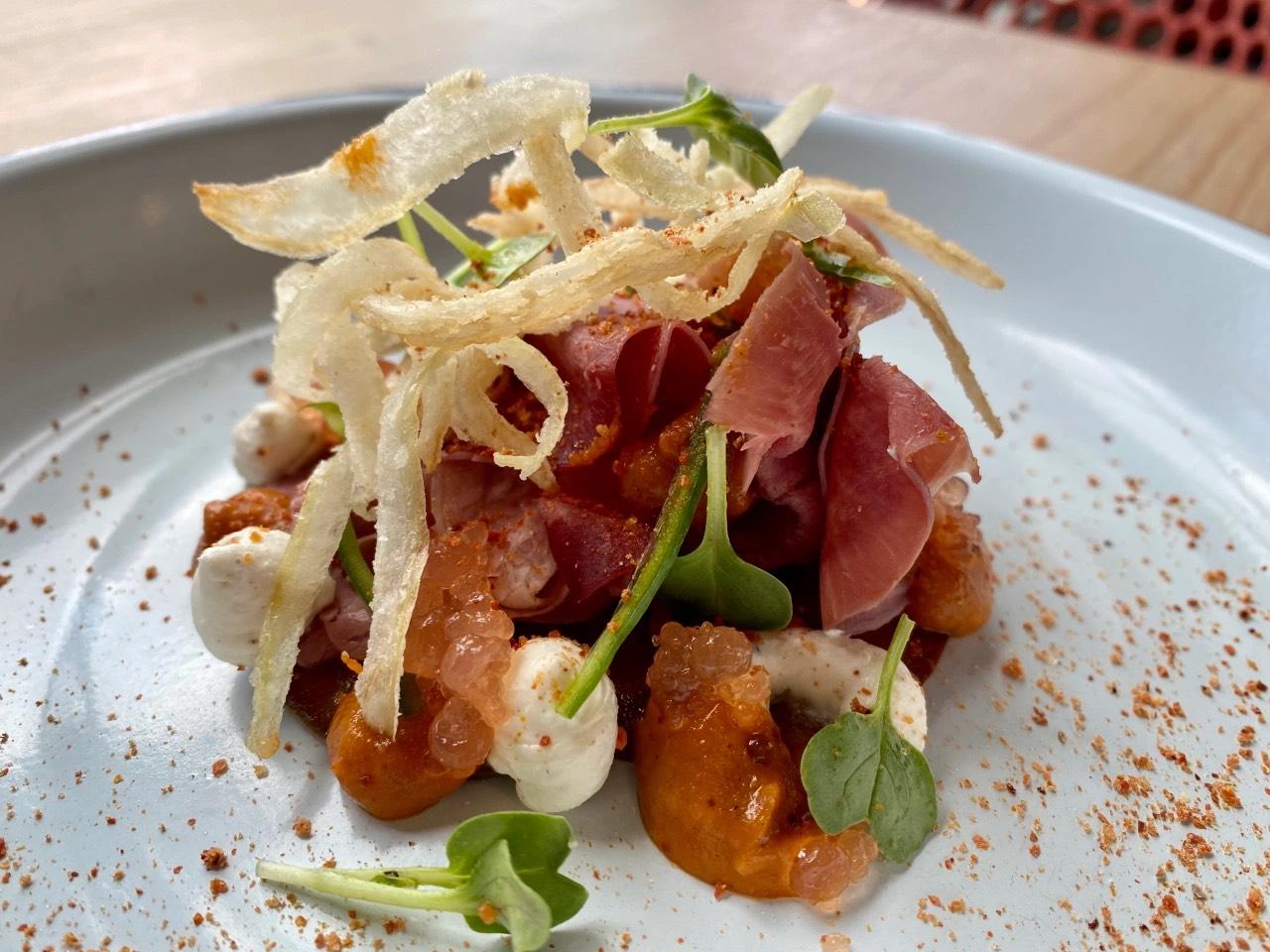
Describing her food, Molefe says she uses the same ingredients and style of her food memories, but always adds a bit more based on what she’s learned in the kitchens in which she has worked.
“For now I’m still learning, and still experimenting in terms of our ingredients – the traditional ingredients I grew up eating – and what I’ve learned so I’m looking forward to that point where there’s a completely blank canvas and I’ll be creating from scratch, something completely new.” Something never seen or done before, I asked? “That’s where I HOPE I’m going,” she said modestly. Having tasted what Molefe is capable of I have no doubt she will achieve this.
The chicken neck mousseline has its origins in a chicken neck stew. “I always wanted to still keep the flavour of the original dish,” said Molefe. “I remember someone had the tart and they said it reminded them of chewing on bones. That’s exactly what I want.” Perhaps I should point out, this means the flavour, not the texture.
“I like that it has a marrowy flavour because when you are eating chicken necks there’s not much meat, so you are literally chewing on the necks. I like that. So the main thing I was trying to get across in that particular dish is getting a nice marrowy, umami meaty flavour,” she said.
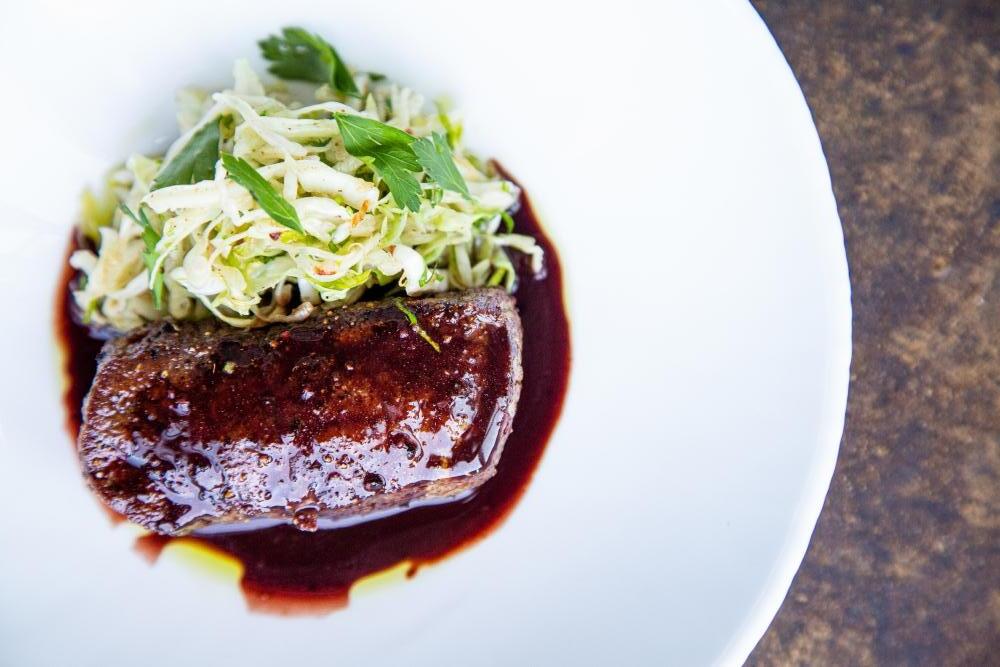
The next course is imiqala yenkunku, a tartlet of the shortest of crust, with chicken neck mousseline and tiny brown vinegar jellies which explode with flavour on the tongue. The penultimate course is ipapa neklabishi, which is braised beef heart with sautéed cabbage, creamy braai pap and beef heart biltong shavings (which Molefe learned to make from Frankie Fenner Meat Merchants).
“When people think of uphuthu neklabishi they always think of it as a Januworry meal because you have spent so much in December that you can’t afford to eat any meat products. For me it is still one of my favourite meals, broke or not, and my Mom makes the best mince and cabbage stew and this meal just reminds me of her.” Served with a creamy mushroom sauce, it was delicious and, well, hearty. I’m sorry. I don’t know why I am like this.
Finally, dessert. Incwancwa – fermented maize porridge, lemon and lime jellies and lemon ice cream – represents Molefe’s mother’s love and effort. “It’s a dish that you have to plan a day or two before you make it. Whenever I think about it a picture of this navy blue Tupperware with a white lid that she always fermented it in comes to mind. I remember this one time I was doing the garden with my Dad and my Mom called us inside for breakfast and she had made it. That memory represents a wholesome family weekend breakfast for me.”
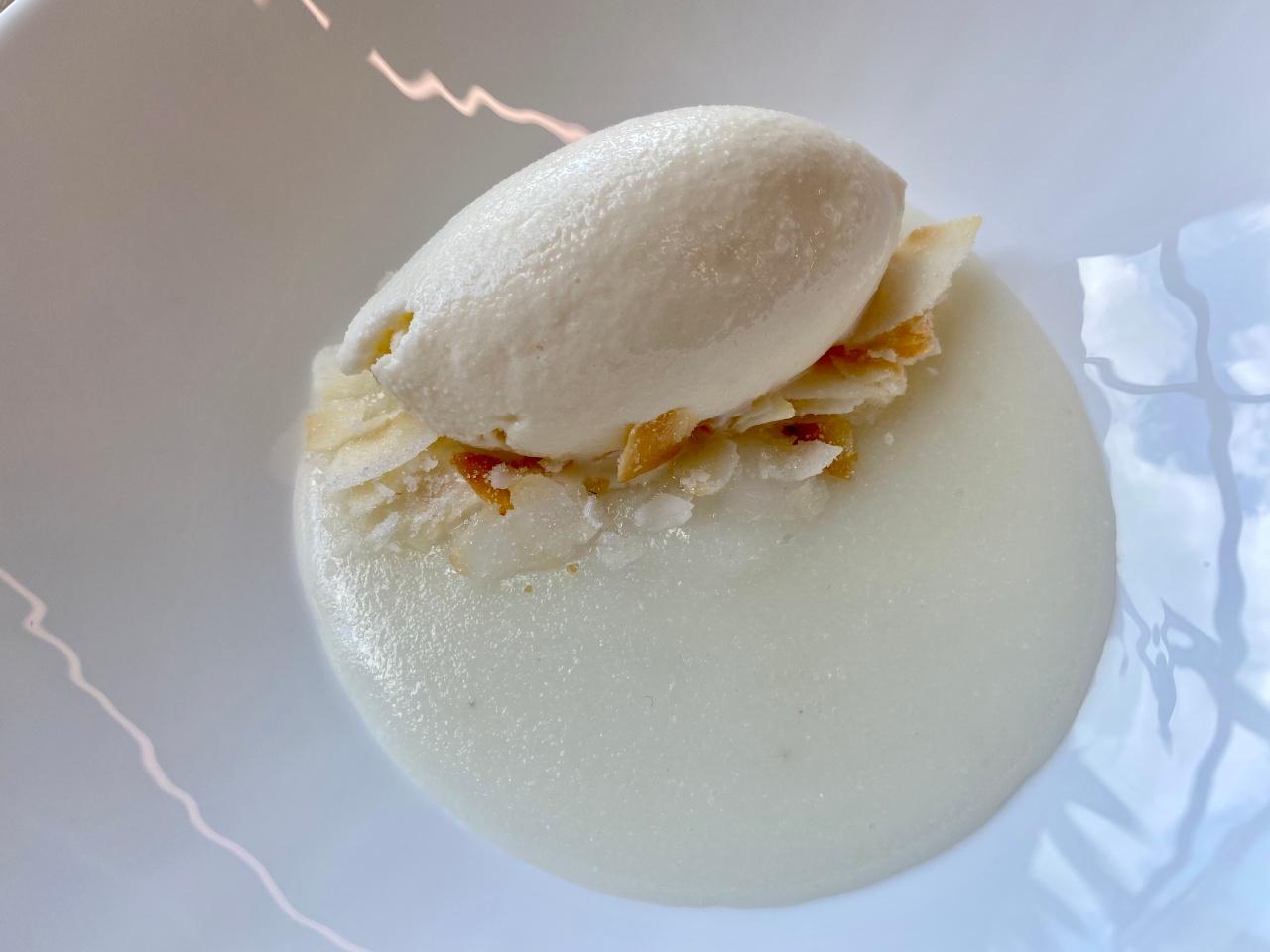
How can you not feel the love in this? In a city where we eat Italian, French, Portuguese – whatever, all the foods of the world – it’s a privilege to be able to taste the heritage and culture of our own country. To be honest, I was a tad reserved about the pudding (liver, neck, tongue, heart, no problem) because I’m not the greatest fan of maize meal, but lawdy Miss Maudie, the first surprise is that it was softly warm against the ice cream which was delightfully unexpected. Also, the ice cream was subtle. I enjoy a lemon dessert as much as the next person but until this day I didn’t realise how much tartness is packed into them, and how beautiful restraint can be.
If I have not yet sung these praises high enough nor loud enough, at the time of writing the news came in that Emazulwini has been nominated in two categories for the 4th annual Luxe Restaurant Awards, hosted by The Hospitality Counsel (sic): New Restaurant of the Year, and African Restaurant of the Year. The ceremony takes place in Johannesburg on March 29, 2022.
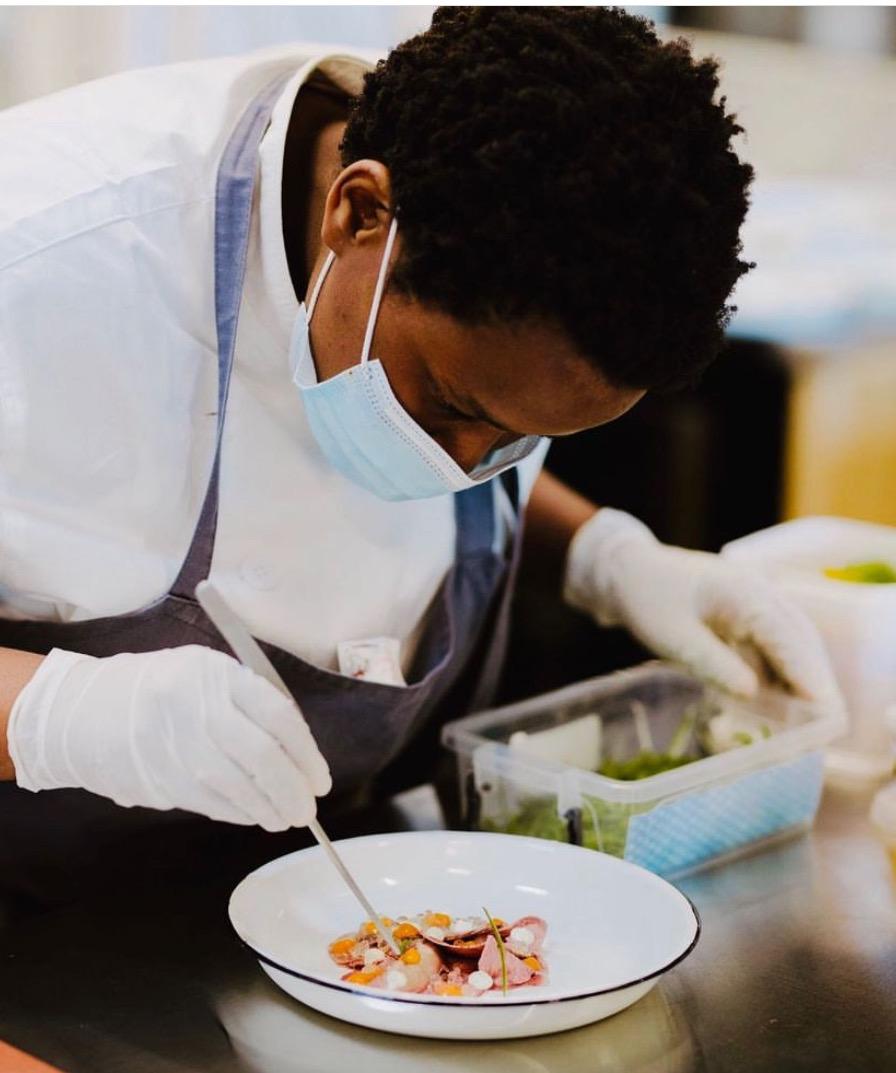
DM/TGIFood
By Bianca Coleman
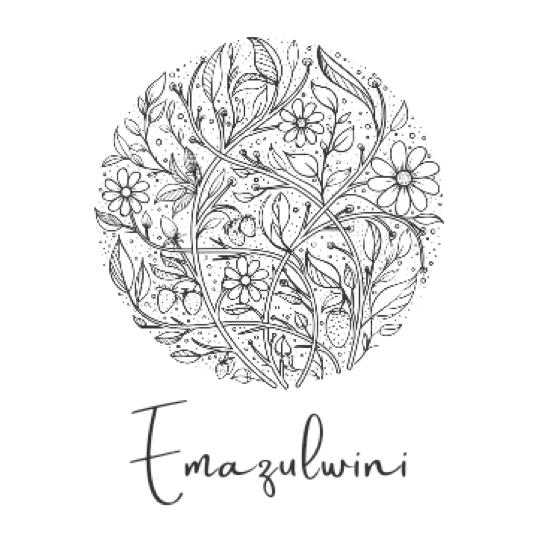


The BeyondCuisine initiative is an inspiring one, and one we are particularly pleased to endorse going forward. With over 99% of our entire staff drawn from local talent at Great Plains, supporting local female chefs and outstanding diverse teams of ‘passionate about cuisine’ people, this effort is one we are proud to partner with, via the HoteliersGuild so we can work together to inspire a new generation of culinary talent based on skill, passion, diversity and appreciation of that talent.
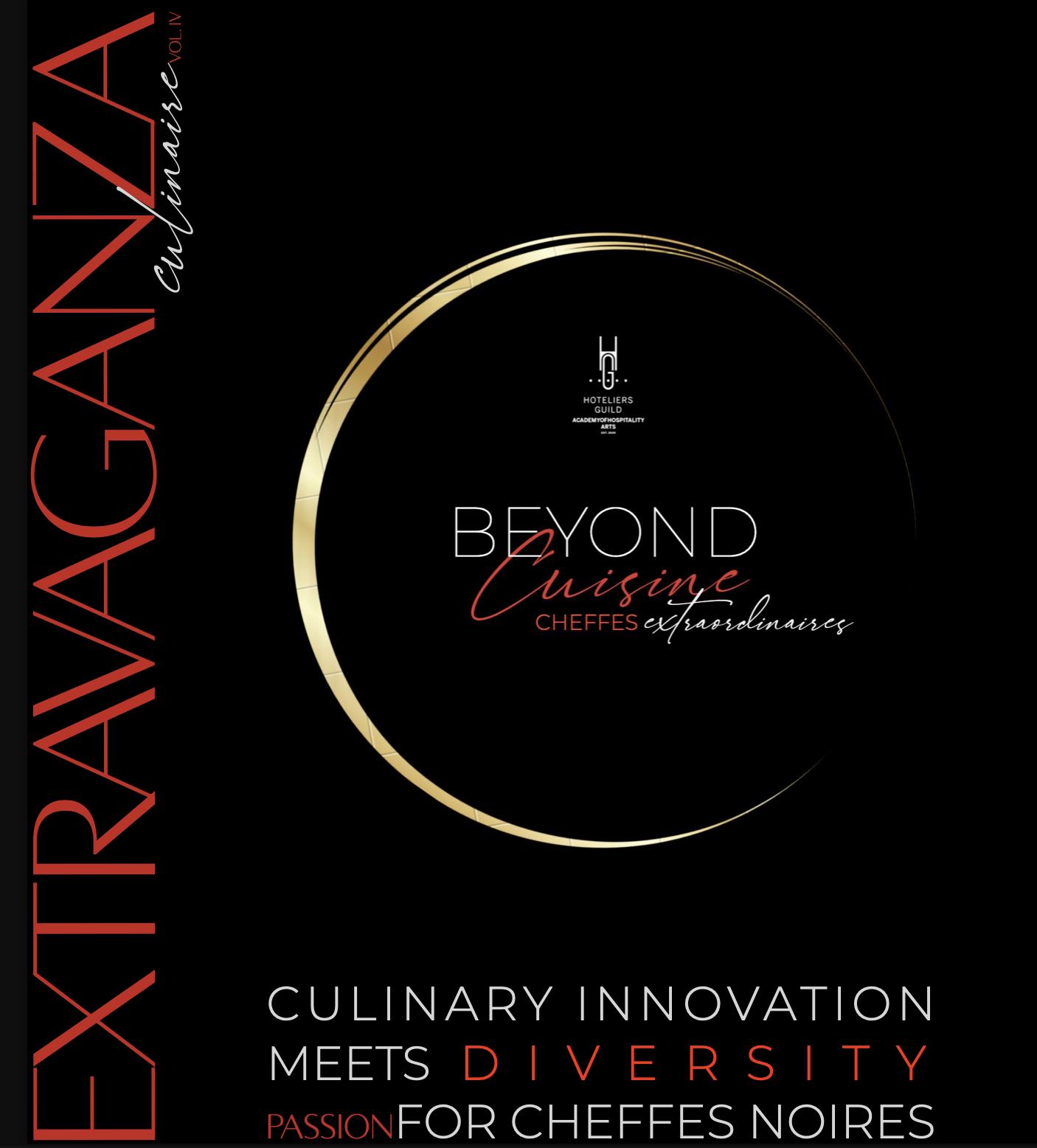
& Beverly Joubert
Ambassadors - HoteliersGuild Academy of Hospitality Arts | CEO of Great Plains Conservation HoteliersGuild


Nourishment and Knowledge: How Adding Missing Ingredients to a Melting Pot Culture is NOT Racist Or
Food and education, two universal languages that have the power to unite us. Each one is a form of nourishment, feeding our bodies and our minds. So, how can an initiative aimed at promoting diversity and inclusion within these two vital arenas be mislabelled as 'racist'? This is a claim that some ill-informed critics would like us to believe when referring to the HoteliersGuild's initiatives, BeyondCuisine and the Sirius Award scholarship campaign.
These initiatives are deeply ingrained in the essence of both food and education, seeking to fill in the gaps where underprivileged groups have been left behind. They are an attempt to provide the missing ingredients, the untold stories and the overlooked flavours to the global gastronomic experience. To label these efforts as 'racist' is as absurd as saying that adding a pinch of salt to a stew would overpower all other flavours. In the culinary world, we understand that each ingredient has a part to play. Some bring depth, others bring brightness, and others, like our humble salt, enhance existing flavours. Our targeted support for black African women is akin to adding this much-needed salt, highlighting the existing flavours of our industry.
By shining a light on underrepresented groups, we are enriching the culinary world, not segregating it. Our initiatives are our way of ensuring that global cuisine hears every voice, tastes every flavour, and learns from every story. We are not aiming for exclusion; we are striving for balance. Our goal is to foster a more harmonious and inclusive gastronomic ecosystem where everyone, irrespective of their background, gets an equal chance to contribute.

If anything, we are guilty of adding too many spices to the mix. That's because we believe the more diverse the ingredients, the richer the stew. The Sirius Award scholarship campaign is an open invitation to all disadvantaged minorities in our industry, not just black African women. We are all about amplifying voices, not silencing them.
This journalist's insinuation is a misinterpretation of the recipe we are following. They have mistaken our attempt to balance the taste profile with an attempt to skew it. If this is racism, then every accomplished chef around the world would be guilty.
To all those who still doubt our intentions, I invite you to take a seat at our table. Taste the dishes prepared by our talented scholars, engage with them, listen to their stories on VoicesOfAfrica on YouTube! You will quickly realise that we are creating a rich, diverse culinary experience, not a brew of bigotry.
Op-ed by Frank M. Pfaller
In the end, the proof of the pudding is in the eating. It's high time we focus on enjoying the symphony of flavours we are creating, rather than quibbling over the proportions of the ingredients. Because what we're cooking up here is a celebration of diversity, not a dish of discrimination.
P.S.: But wait a minute! I just remembered, I am, in fact, a 'racist'! Or so it was perceived many moons ago in Apartheid South Africa. As a young general manager of the then ultra luxurious five-star Maharani Hotel in Durban, I made a decision that caused quite the stir. My well-meaning, but racially-minded (White) personal assistant approached me for separate dates to throw Christmas parties for Whites, Blacks, Indians and Coloureds. With naivety, or perhaps wisdom beyond my years (?), I ordered ONE single party - an all-inclusive celebration, a Christmas for all. This was not a decision born out of ignorance, but rather an assertion that there is, indeed, only one race: the human race.

This single act of unity, this mixing of the pot, was a tremendous success among the staff. However, it earned me a rather contentious badge of honour as a 'racist'. The press called for my immediate expulsion from the country, if not my incarceration. Just imagine, a 'racist' for throwing a party for humanity!
And what saved me from this preposterous accusation? The intervention of one of our regular guests, none other than P.W. Botha, South Africa's then-President, and my superior, the legendary Sol Kerzner (RIP). Yes, if promoting unity, peace, and common humanity makes me a 'racist', then I wear that label with immense pride. After all, who wouldn't want to be 'racist' in a world that so desperately needs more love, unity, and understanding? And again, if that makes me a 'racist', then please, pour me another glass of that 'racist' punch! I'll drink to that.
CULINARY INNOVATION MEETS DIVERSITY

PASSION FOR CHEFFES NOIRES
I am delighted to endorse the Beyond Cuisine initiative to support the DEI efforts to empower black female chefs in Hotels. It is crucial that we create a welcoming and inclusive environment for all individuals, regardless of their background. If we promote equitable access and provide resources, we can work together toward a more diverse and inclusive hospitality industry. We all must participate in this effort, and I encourage everyone to support this initiative and its goals.

Prof.Maribel Esparcia Pèrez HoteliersGuild Academy of Hospitality Arts
Managing Partner of the European Sustainable Hospitality. Group HoteliersGuild


Viva Viviana Varese Milano, Italy
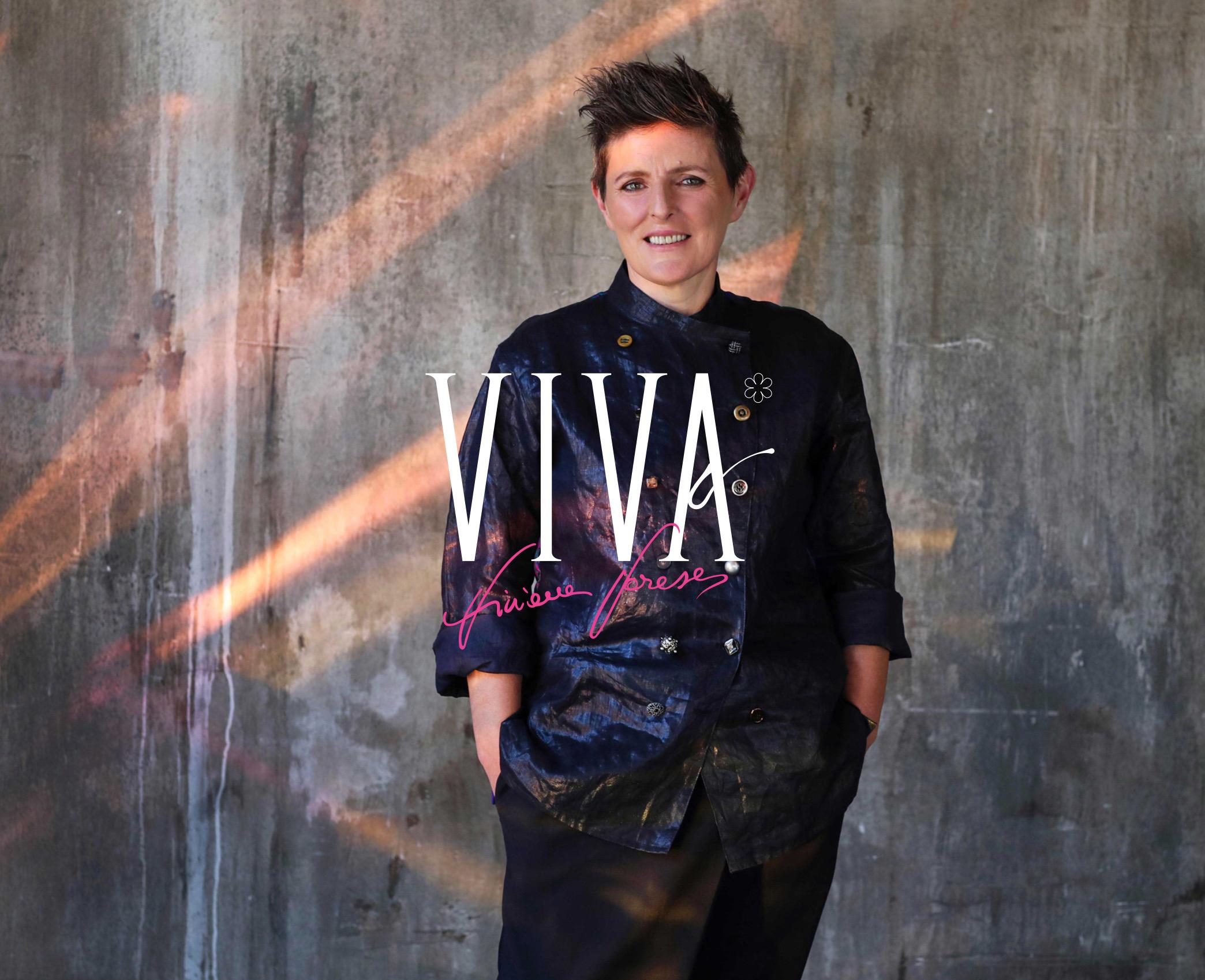
From a panoramic view of Milan's Piazza XV Aprile to an inspiring journey through the high-end gastronomy world, Chef Viviana Varese's story offers a refreshing perspective on the entrenched culture of the culinary industry. Despite being widely recognized as "misogynistic, white and racist," Varese has carved her own niche, demonstrating that talent and passion can outshine traditional stereotypes and biases.
Viviana is an active advocate for diversity and equal opportunity within her industry. Born in the Amalfi Coast, her experience as an immigrant, combined with the challenges she faced due to her weight and sexual orientation, inform her approach in the kitchen and beyond. Today, her restaurants serve as a beacon of change, championing inclusive hiring practices and equal opportunity.
Viviana Varese is not only recognized for her culinary talent, with her restaurant Viva earning a Michelin star and a spot on the coveted "The World's 50 Best Restaurants" list, but also for her advocacy for marginalized groups. Her workforce is notably diverse, featuring former drug addicts, refugees, and a balanced gender representation.
The narrative of the HoteliersGuild BEYONDCUISINE and the SIRUIUSACADEMYAWARD scholarship campaign aligns perfectly with Viviana's vision. The scholarships, designed to assist black African females, promote equal opportunity in the hotel and gastronomy industry, a sector notorious for its racial and gender disparities.
Viviana's story serves as a testament to the impact of such initiatives. By fostering talent and diversity in an industry that has long been criticized for its exclusivity, BeyondCuisine, along with Viviana, is advocating for change, equality, and fair representation in high cuisine.
Applauding Viviana for her steadfastness, here's the trigger for my own 'outburst', a summary outline of an excellent article, "High cuisine is still overwhelmingly misogynistic", white and racist" written by Anne Goebel and published in the Sueddeutsche Zeitung.
Varese's restaurant 'Viva', located in Milan, has earned her significant recognition including a Michelin star and a spot on 'The World's 50 Best Restaurants' list for its innovation.
The article delves into Varese's unique perspective on gastronomy which is deeply influenced by her personal journey as a lesbian woman from the south of Italy, often belittled as 'terroni' or earth eaters. Despite facing numerous rejections in her early career due to her gender, Varese emerged as a successful self-taught chef. She shares her concerns about the prevalent exclusion, lack of equal opportunities, and entrenched hierarchies within the culinary world, and expresses her desire to change these dynamics.
Varese's activism extends to her kitchen, where she employs a diverse brigade including women, former drug addicts, refugees, and people from all backgrounds. Her restaurant décor echoes her advocacy for diversity and inclusivity, featuring coloured glass objects, friendly light wood, and rainbow-coloured cutlery.
Her personal experiences of discrimination have also influenced her culinary style, with dishes like the grilled artichoke heart with dark chocolate and liquorice, and the small steamed pizza ball with a sweet tomato centre reflecting the flavours of her southern Italian origins.
In addition, she spearheads a project called 'Io sono viva', employing victims of domestic violence to create ice cream creations, fruit tarts, and breakfast brioches. The restaurant also sources locally produced vegetables and fruits from the Amalfi Coast and her own garden attached to her second restaurant, 'Villadorata', in Sicily.
Through the article, Viviana asserts her stance against the discrimination still prevalent in high cuisine, emphasizing the necessity for inclusion and diversity, and sharing her commitment to disrupting traditional hierarchies within the culinary world.
THANK YOU FOR SUPPORTING THIS NOBLE CAUSE!











